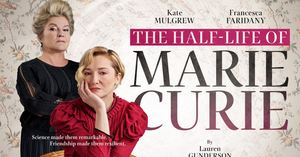Review Roundup: THE HALF-LIFE OF MARIE CURIE

The Half-Life of Marie Curie just celebrated opening night at the Minetta Lane Theatre (18 Minetta Lane, between MacDougal & 6th Avenue - one block south of W. 3rd Street), Audible's creative home for live performances in New York.
Science made them remarkable. Friendship made them resilient. Obie Award winner Kate Mulgrew and Francesca Faridany star in The Half-Life of Marie Curie, a compelling new play about renowned scientist Marie Curie and radical engineer Hertha Ayrton-and the friendship that strengthened their resolve to pursue their ambitions. With lyricism and wit, playwright Lauren Gunderson has crafted an honest, unexpected story that follows Marie Curie during the summer of 1912 when news of her secret affair threatens to overshadow her second Nobel Prize win. Heartbroken, Curie leaves France to stay with Ayrton at her home on the British seaside and together they confront the scandal that could end Curie's career-and drastically alter her life.
Directed by Gaye Taylor Upchurch, The Half-Life of Marie Curie is a timely celebration of two brilliant women who have been overlooked by history for too long. Written expressly for Audible through its Emerging Playwrights Fund, the play will be available to Audible listeners globally on Thursday, December 5th.
Let's see what the critics are saying...
Elisabeth Vincentelli, The New York Times:
Faridany (who portrayed the teacher in "The Curious Incident of the Dog in the Night-Time") pulls off a hybrid Polish-French accent that is miraculously unobtrusive, and she looks convincingly haunted as Marie fingers her radium pendant, glowing green with menace as the ominous rattle of a Geiger counter echoes in the background. (Curie often carried the lethal element and, unsurprisingly, died of radiation-induced anemia.) And the tart, no-nonsense Hertha is a perfect fit for Mulgrew, a naturally commanding performer who is equally at ease playing the beloved, honorable Captain Janeway on "Star Trek: Voyager" and the beloved criminal Red on "Orange Is the New Black."
Melissa Rose Bernardo, New York Stage Review: Gunderson-America's most-produced living playwright-is a whiz with snappy back-and-forth dialogue, such as this late-night whiskey-fueled exchange. Hertha: "You had a scandalous international love affair and I am a lonely widow now can we please discuss the sex." Marie: "You're terrible, it was fabulous, leave me alone." And she turns the final scene-which is really just a laundry list of the women's achievements from World War I and beyond-into a rapid-fire discussion-eulogy hybrid. The interior-monologue moments-when Marie plunges into the ocean, for instance-don't flow as well as the Hertha-Marie scenes, but something tells me they'll be more successful for listeners: Audible will release The Half-Life of Marie Curie as an audio play on Dec. 5.
Jesse Oxfeld, New York Stage Review:
It is, as I say, a well-produced school play. But! That might well be Gunderson's goal here. Or at least her producer's. The venerable Minetta Lane is now the home of Audible Theater, a space where "electrifying storytellers and performers take the stage," as Audible puts it, for live performances that are recorded and then distributed by the Amazon-owned audiobook company. And The Half-Life of Marie Curie is, as Gunderson writes on the script's title page, an Audible commission. So it's entirely possible she was asking to write a well-produced education film, entirely reasonable to think that what's on stage is succeeding on its own terms. Those terms just aren't New York theater's.
Raven Snook, Time Out New York: But while The Half-Life of Marie Curie may not be as inventive as the women it celebrates, it's enlightening and entertaining. Under Gaye Taylor Upchurch's unfussy direction, Faridany fleshes out the passive-depressive Curie with revealing flashes of intense passion for science and sex. Impressively, she holds her own opposite supernova Mulgrew, who is playing the lesser-known figure but has all the best lines. (Mulgrew's expressive voice will certainly be a highlight of the recording of the play that Audible plans to release.) Their performances do a lot to bring Gunderson's history lesson to life. These two women have chemistry.
Robert Hofler, The Wrap: "Marie Curie" contains several nice comments about her dead husband, Pierre Curie. Otherwise, the play is chock full of witty complaints about the male establishment, as if these two brilliant women had nothing better to do than kvetch all day. Gunderson puts us in that comfortable position of being superior to early-20th-century wrongdoers who canceled Curie's career. Much less comfortable would be a play that looked at our current Cancel Culture that banishes artists from the Metropolitan Opera and prevents Woody Allen's latest film from being shown in the United States.
Reader Reviews



